Do you have an emotional relationship outside your marriage? Something that began as a platonic friendship but now you’re emotionally invested in? Do you feel more connected, in sync, and understood by this other person than your partner? If so, chances are you’re in one of the 7 stages of emotional affairs.
This revelation might make the ground beneath your feet quiver and shift because you may have never imagined yourself to be one of those who dishonor the promise of loyalty and commitment in a relationship. Besides, you may not have even realized (or acknowledged) that your actions are tantamount to something as serious as infidelity. However, this phenomenon is more common than you’d think, and so many people, either willfully or unwittingly, find themselves embroiled in different levels of emotional affairs without fully realizing the damage it can cause to their primary relationship.
A look at emotional cheating vs physical cheating findings puts things into perspective: 15% of married women and 25% of married men confessed to indulging in extramarital sex. But when it comes to emotional infidelity in marriage, the numbers skyrocket. About 35% of women and 45% of men reported indulging in emotional adultery at least once in their marriage. Intriguing, isn’t it? Let’s take a close look at the dynamics of cheating emotionally, what fuels it, and how to recover from it, to help you tide over this stumbling block, irrespective of which stage of an emotional affair you’re in.
What is Emotional Infidelity?
Table of Contents
On emotional affairs and divorce, the American Association for Marriage and Family Therapy wrote, “A new crisis of infidelity is emerging in which people who never intended to be unfaithful are unwittingly crossing the line from platonic friendships into romantic relationships.” If you’re wondering, “Am I having an emotional affair?”, the answer is “yes” if you are:
- Sexting someone/getting aroused from the conversation
- Hiding your friendship from your partner
- Confiding in an emotional partner (who isn’t your primary partner) about your problems
- Non-sexual physical touch (e.g. cuddling, hugging, massaging, holding hands)
- Hanging out alone with someone that you know has a crush on you
- Going out (one-on-one) with someone you find attractive
On emotional affairs and texting, a Reddit user wrote, “If you delete or hide messages/calls from someone, that’s a huge red flag.” But is an emotional affair adultery? Yes! Even if you’re not physically involved with someone, you’re channeling so much emotional energy into this new relationship. You’re neglecting your SO’s emotional/physical needs and even lying to them.
Related Reading: Therapist’s Tips On How To Deal With Emotional Infidelity
How Do Emotional Affairs Start? 5 Top Reasons
A Reddit user wrote, “Emotional cheating starts in the head. It’s about who comes first. As the one who is cheating, ask yourself who has the first spot in your thoughts every day. If it’s not your SO, but someone else, it might be cheating.” But why is someone else so irresistible all of a sudden? Here are some possible reasons:
1. Dissatisfaction with the primary relationship
In a survey, 48% of men rated emotional dissatisfaction as the primary reason they cheated. So, if one of you is emotionally distant or you both have started taking each other for granted and the relationship has gotten boring, it can increase the likelihood of an emotional connection with someone else. Here’s why platonic affairs start:
- ‘Something’ is missing in your relationship but you don’t know what exactly that is
- You know what is missing but are never able to express it in an open, honest, and transparent manner
- You have expressed your unmet needs multiple times but the attempts to fix them proved to be unsuccessful
2. Seeking emotional validation elsewhere
If a third person fulfills the need for emotional validation and fulfillment that is lacking in your primary relationship, a deep attachment can quickly develop. The American singer Jessica Simpson confessed in her memoir Open Book that she had an emotional affair with co-star Johnny Knoxville, during her marriage to Nick Lachey. She wrote, “I could share my deepest authentic thoughts with him and he didn’t roll his eyes at me. He actually liked that I was smart and embraced my vulnerabilities.
“First off, we were both married, so this wasn’t going to get physical. But to me, an emotional affair was worse than a physical one. It’s funny, I know, because I had placed such an emphasis on sex by not having it before marriage. After I actually had sex, I understood that the emotional part was what mattered…Johnny and I had that, which seemed far more of a betrayal to my marriage than sex.”
Related Reading: 12 Ways To Build Intellectual Intimacy In A Relationship
3. Childhood trauma
It’s time for some self-reflection. Your attachment style and self-esteem have everything to do with how you navigate relationships. You’re more likely to indulge in emotional adultery if:
- Your parents cheated on each other and normalized betrayal for you
- You have deep fear of abandonment and hence find ways to avoid intimacy with your SO
- Your fantasy world of ‘eternal youth’ helps you escape real life responsibilities
4. Belief that texting is harmless
If you’re an emotional cheater, you divide the world into black and white to justify emotional infidelity in marriage. You view sexual physical affairs as “immoral” and “harmless flirting” as appropriate. So, you don’t feel guilty and gaslight your partner for being paranoid or jealous. You’re in denial of your shadow side.
5. Need for newness/variety
Psychotherapist Esther Perel emphasizes in her TED talk, “At the heart of an affair lies a longing and yearning for human connection, novelty, freedom, autonomy, sexual intimacy, a wish to recapture lost parts of ourselves and an attempt to bring back vitality in the face of loss and tragedy.” Therein lie the reasons why emotional affairs take hold and turn intimate:
- You crave novelty/excitement that’s no longer exists in your primary relationship
- Keeping secrets gives you a false sense of power
- You’re tired of being the ‘good’ person, and this is your way of rebelling without actually crossing a line
The 7 Stages Of An Emotional Affair
Now that we’ve talked about how do emotional affairs start, it’s time to move on to what comes after – the 7 stages of emotional affairs. The transition from a deep friendship to an emotional connection can be so faint that you may not even realize when you’ve crossed the line. These affairs start innocently and creep into your life, creating turmoil in your long-term relationship. Let’s understand these stages of infidelity in greater detail.
Related Reading: Attracted To Coworker And Don’t Know What To Do About It
1. Friendship
There are different levels of emotional affairs, starting with an ‘innocent’ or ‘harmless’ friendship. Emotional affairs and texting go hand-in-hand. During the friendship stage, the conversations are centered around everyday tasks/hobbies. There may be cursory intimate talk on social media but it is at a superficial level, with no real sentiment behind it. Here’s how it goes:
- A coworker or a dear old friend becomes your confidante
- Your text messaging and Facebook interactions may intensify
- You feel lucky to have a person who truly ‘gets’ you
- You look forward to making them feel special/important
2. The more-than-just-friends stage
On the second stage of cheating, a Reddit user wrote, “Communication: there is excitement, future affair partner is described as cocky/bubbly/funny/anything noteworthy, maybe there is the confession of a slight crush, an acceptance that future AP is attractive…”
You share more with this person than with your partner. You are not sleeping together or anything but there’s an underlying sexual tension. Slowly, you start enjoying the faint flirtation. You may not have wanted to indulge in or actively sought inappropriate friendships when married/in a committed relationship but, the line between emotional cheating vs friendship gets thinner and thinner. If you’re wondering, “Am I emotionally cheating?”, think:
- Do you often think of your friend?
- Do you look forward to spending time with them?
- Do you try to keep your ‘friendship’ a secret?
If the answer to these questions is “yes”, then you’ve already crossed the boundaries of friendship and are emotionally invested in someone other than your partner.
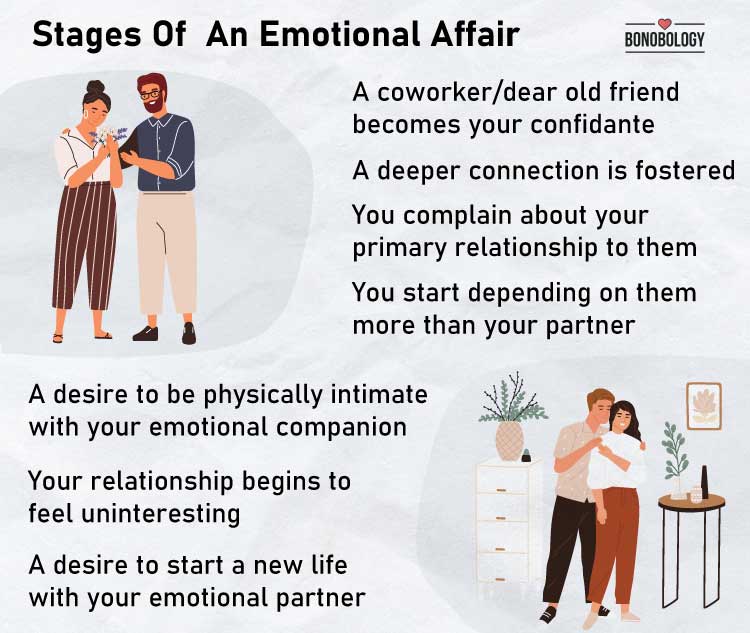
3. How to tell if it’s an emotional affair? See if you have reached the ‘complaining’ stage
Once emotional cheating vs friendship lines have blurred, staying in constant contact and complaining and venting to this ‘special friend’ becomes the norm in stage 3. Some of the common yet unrecognized emotional cheating signs at this stage include:
- Complaining about your partner’s inadequacies
- Telling your friend what you want your life to be like
- Sharing secrets and making them the third wheel in your relationship
4. Sexual desire is one of the 7 stages of emotional affairs
The emotional attachment gets deeper. You start noticing personality traits in your ‘friend’ that are missing in your official partner. A desire to be physically intimate with your emotional affair partner begins to take hold. As a result,
- You fantasize about your emotional companion while having sex with your significant other
- Sexual insinuations and innuendo becomes a part of your interactions with this other person
- You start wearing fragrances and getting gifts for your emotional interest
- If it is a long-distance emotional affair, you may start sexting
5. The depending-on-each-other stage
You and your ’emotional partner’ are an inseparable team now, confiding in each other, helping each other make decisions, sharing conundrums and confusions with each other, and turning to each other for support. You may even begin to avoid doing things with your partner in order to carve out more time for your emotional companion. This level of an emotional affair becomes exasperating for your romantic partner because they’re tired of being ignored by the person they love and fail to understand why you are behaving so weirdly.
If you’re still wondering how to tell if it’s an emotional affair and not sure whether your ‘special friendship’ has veered into this territory, ponder upon some questions:
- Do they decide which outfit suits you?
- Do you seek their advice on switching your job?
- Do you trust them even more than your gut instincts?
6. Being indifferent to your relationship
By this stage, the emotional involvement becomes so profound that you become indifferent to the life you’ve built with your partner. You feel like escaping your current life. This is the stage when you go through the worst turmoil because you finally acknowledge the lack of emotional connection in your primary relationship.
You tend to find a home in your extramarital affair. This person is comforting and soothing and fulfills your emotional needs. You’re headed toward a lifelong extramarital affair, but in the heart of your hearts, you want it to be something more. You know that relationships that begin as affairs are too complex but at this point, you don’t really care.
7. The final decision – do emotional affairs turn into love?
This is why emotional affairs and divorce are related. Out of the 7 stages of emotional affairs, this is the stage wherein the desire to leave takes over. You start seeing signs your relationship is beyond repair and pretty much give up on your primary partner. This is where, emotional affairs turning intimate could lead to a breakdown of a marriage.
A classic example of that is what was shown in the film Lunch Box. The two characters had not even seen each other but they connected so strongly through letters hidden in a lunchbox that the woman wanted to leave home and start a new life with this man who was way older than her. So, do emotional affairs turn into love? Yes, they can.
Sometimes emotional affairs can also fizzle out. There is no guarantee that your emotional affair is going to be the love of your life. But unlike sexual relationships, emotional affairs are stronger and hence last much longer and have more serious consequences.
Related Reading: I Can’t Forget My Husband’s Affair And I Feel Tormented
How To Repair A Relationship After An Emotional Affair
Is getting over an emotional affair possible? Responding to this question, psychologist Nandita Rambhia previously told Bonobology, “Yes. However, fixing the damage done by the 7 stages of emotional affairs takes time. Healing and forgiving require a lot of effort from both partners. It can only happen if both feel a strong need to rebuild love from scratch. If this need is strong, sincere, and honest, the chances of moving ahead are high.”
Even research suggests that re-trusting a partner who has caused emotional trauma requires openness, the intention to cooperate, sharing, and mutual support between partners. With this, we arrive at some golden rules to follow:
1. Cut off connection and contact
Getting over an emotional affair starts with cutting off contact, no questions asked. It might hurt to say goodbye to the person who made you feel happy. But to work on your relationship, you must follow the no-contact rule with the affair partner.
According to the Gottman Repair Checklist, here are some phrases you can use when trying to show accountability for the damage that you caused:
- “I really blew that one”
- “I can see my part in all this”
- “How can I make things better?”
- “I’m sorry. Please forgive me”
- “I want to be gentler to you right now and I don’t know how”
2. Fall back on your partner
You have your partner to fall back on for emotional support and rebuild that intimacy with them. If an aspect of the relationship is troubling you, you need to share it with your partner. Vent all you want but to your partner. Become best friends with them and try to adjust/accept instead of compromise.
Talking about adjustment (instead of unhealthy compromise), the Gottman Repair Checklist mentions a couple of phrases that can help you heal from the pain of the past:
- “I agree with part of what you’re saying”
- “Let’s find our common ground”
- “I never thought of things that way”
- “What are your concerns?”
- “Let’s agree to include both our views in a solution”

3. Your partner needs to understand
Now is a great time to talk about why you did what you did. If you were dissatisfied with your partner, felt inadequate, or unhappy in the relationship, now is the time to talk to your partner about these issues. But your partner needs to know that unnecessary expression of anger or resentment toward you won’t help the healing.
It helps to seek guidance from someone more experienced, mature, and non-judgmental. It can be a family member, friend, or professional counselor. If you’re looking for support, our counselors from Bonobology’s panel are just a click away.
4. Talk about the gaps in your relationship
You should talk about the person you were having an emotional affair with. As guilty as that would make you feel and as angry as it might make your partner feel, this is crucial. What are the things that drew you to this person – was it their empathetic nature or the fact that they were a good listener?
Sort them out. Spell them out for your partner. These were the inadequacies or the gaps in your relationship. As painful as it might be to bring them up, it is essential to talk about it and understand where your relationship was lacking.
Related Reading: 8 Conflict Resolution Strategies In Relationships That Almost Always Work
5. Express gratitude
Looking for tips on how to fix emotional detachment in marriage? Research shows that expressing gratitude increases comfort in relationships. So, reignite the spark in your love life by expressing gratitude regularly. Here are some phrases that you can use to appreciate your partner, according to the Gottman Repair Checklist:
- “Thank you for…”
- “I understand”
- “I love you”
- “I am thankful for…”
- “This is not your problem. It’s OUR problem”
Key Pointers
- If two married people cheating with each other was normalized growing up, you’re more likely to cheat
- The 7 stages of emotional affairs start with talking about personal feelings
- If they’re the first person you think about in the morning, it’s not a good sign
- Having more than one partner can eventually take a toll on your mental health
- Taking time and couples therapy can help you rebuild trust
This is one of the reasons why a strong friendship and intimate connection in the relationship is one of the best antidotes to an affair. So, what can you do to safeguard your relationship against such an emotional affair in the future? The first step is to come together as friends and base your relationship on the foundation of trust.
Love and respect each other. Communicate openly and frequently. Share your feelings, plans, and any issues that you have with each other. Have fun and make a conscious effort to work through the emotional trauma of infidelity. These are wise ways to deal with infidelity and have a strong marriage where you have an emotional connection with your spouse and none else. Have a blissful relationship!
FAQs
Emotional affairs are said to last 6 months to three years usually, as per Denise Bartell, Ph.D., a psychologist at the University of Wisconsin, Green Bay. However, emotional affairs are not defined well in the first place. Is texting someone else cheating? Is sexting/sending nudes? Or sharing vulnerable feelings you would never tell other friends? Maybe this is why it’s the most complicated of the 9 forms of infidelity in marriage/relationships.
There aren’t many studies on the percentage of emotional affairs that turn physical. But, it is easier to cross the physical boundaries of fidelity at any one of the 7 stages of emotional affairs. A Reddit user wrote, “With all barriers removed, a consummate knowledge of each other’s desires, having exchanged nudes and discussed what each other like during sex in detail and being in regular 121 situations all it takes now is a glance or a touch of the leg and it becomes physical.”
One thing you need to know is that affairs start with a conversation. So, when a man becomes overly protective of his phone, doesn’t let you access it, changes his password, or keeps looking over his shoulder while texting someone, it could mean that there is another woman in the picture.
How To Stop Overthinking After Being Cheated On – Expert Recommends 7 Tips
What Are The Consequences Of Affairs Between Married Couples?
Your contribution does not constitute a charitable donation. It will allow Bonobology to continue bringing you new and up-to-date information in our pursuit of helping anyone in the world to learn how to do anything.

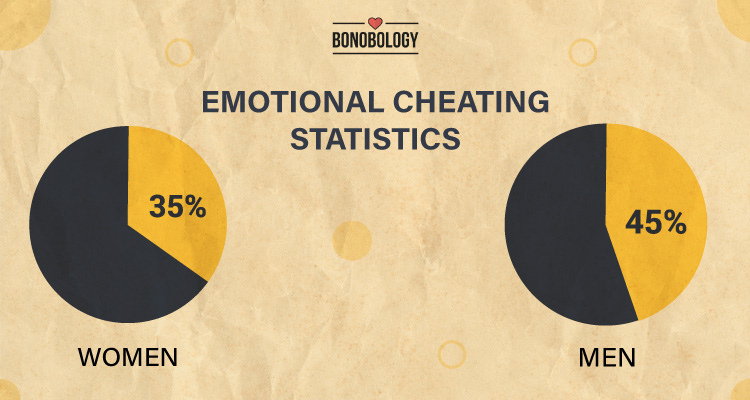

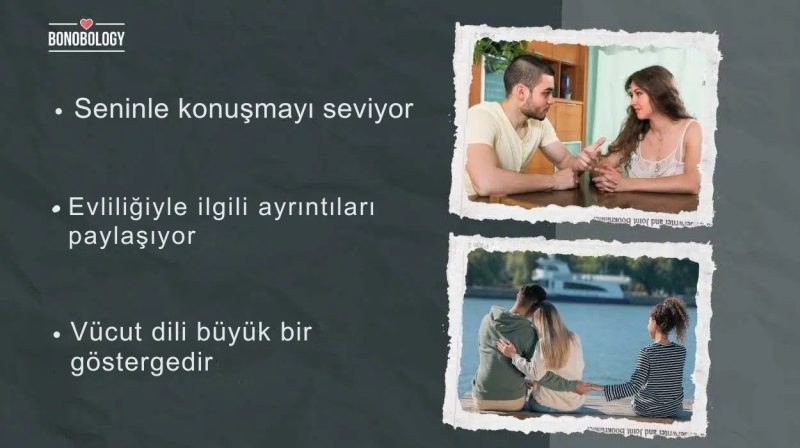

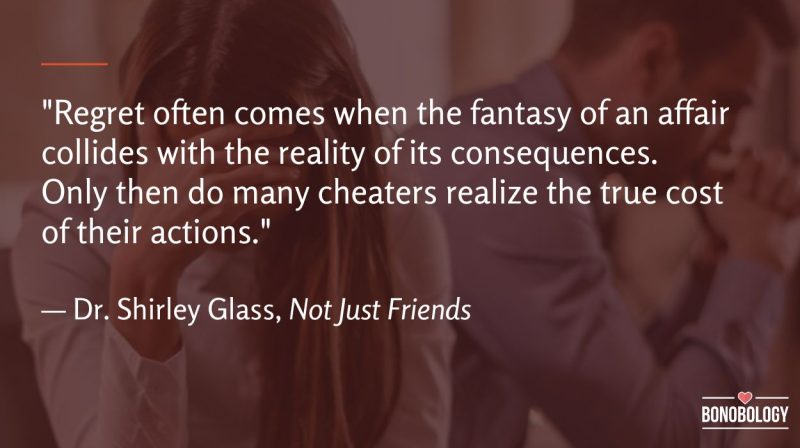





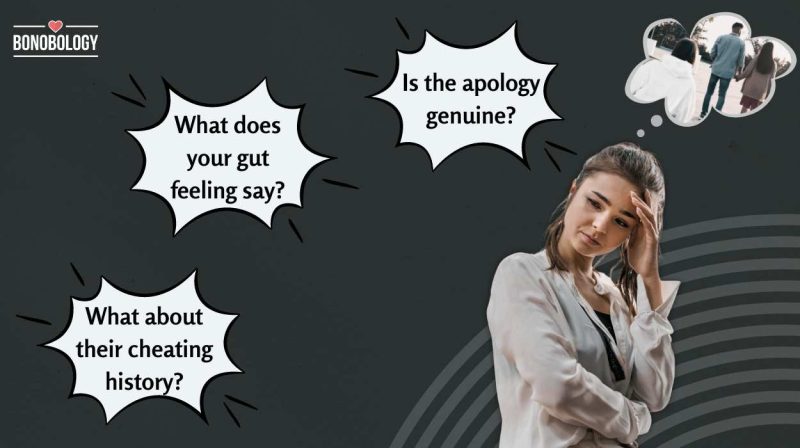




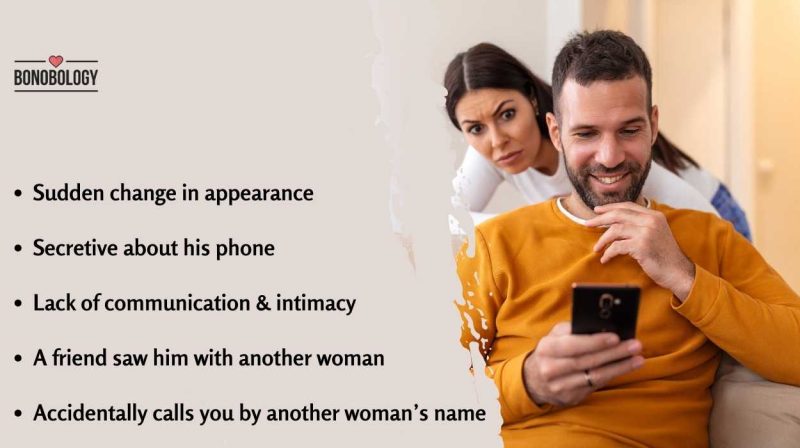
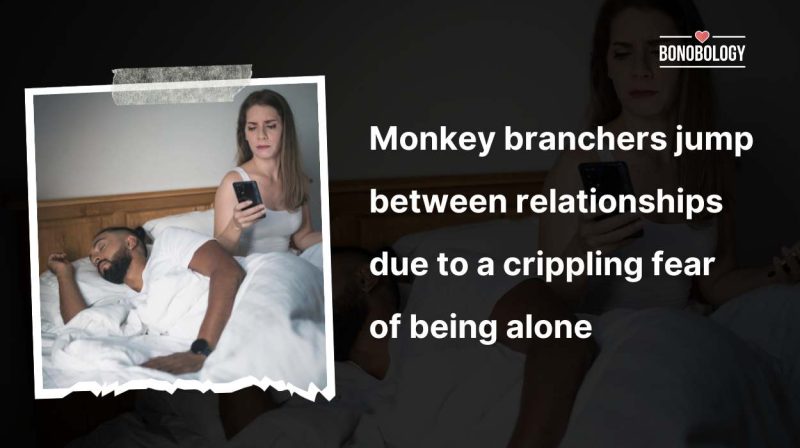

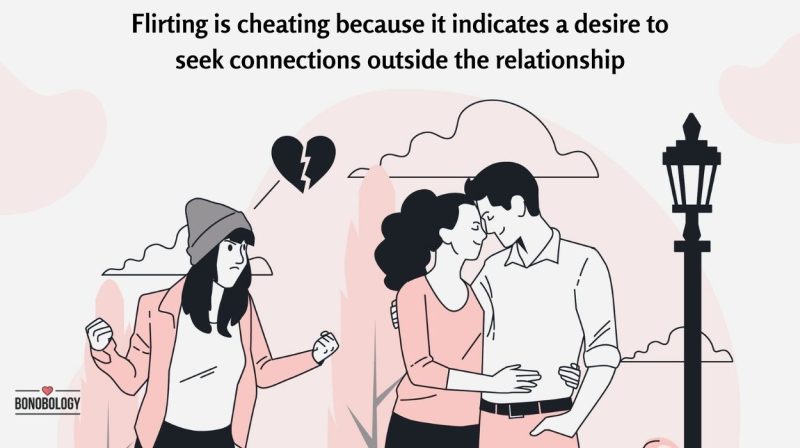



Featured
Evli Bir Erkeğin Size Aşık Olduğunu Gösteren 12 İşaret
11 Apps for Cheating Husbands—Catch Him Red-Handed
When Do Cheaters Realize They Made A Mistake? 10 Scenarios
5 Best Cheating Spouse Tracker Apps (Android & iPhone)
How To Catch A Cheater That Deletes Everything: 12 Hacks
33 Signs Of Micro-Cheating — Is Your Partner Guilty Of These?
7 Therapist-Approved Things To Do If Your Boyfriend Is Cheating On You
11 Heartbreaking Signs Your Husband Misses His Affair Partner
Should You Forgive A Cheater? 8 Factors To Consider
How Can You Tell If Your Fiancé Is Cheating? 15 Signs To Look Out For
Is Marriage Never The Same After Infidelity?
13 Uncommon Signs of Cheating People Wish They Hadn’t Ignored
15 Cell Phone Cheating Signs That Confirm Infidelity
Gut Feeling He’s Cheating, No Proof? 31 Signs Your Instincts Are On Point
Monkey Branching: Meaning, Signs, And Ways To Deal
Painful Message To A Cheating Boyfriend: 50 Brilliant Ideas
Is Flirting Cheating? 9 Reasons It Is And 7 Ways It Can Harm Your Relationship
What To Do If You Suspect Your Husband Is Cheating But Have No Proof
Understanding Post-Infidelity Stress Disorder – Signs and Recovery Tips
15 Signs Your Husband Is Cheating On You With A Coworker